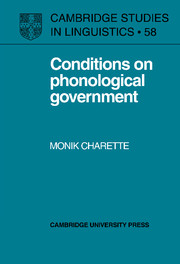Book contents
- Frontmatter
- Contents
- Preface
- Introduction
- 1 A theory of government in phonology
- 2 The ‘e-muet’ in French
- 3 Earlier treatments of schwa
- 4 An analysis of schwa in terms of government
- 5 Licence to govern
- 6 Word-final empty nuclei
- 7 Compounds and phrases
- 8 The alternation between schwa/zero and [ɛ]
- 9 Miscellaneous issues
- Conclusion
- Notes
- References
- Index
- Recent titles in Cambridge Studies in Linguistics
8 - The alternation between schwa/zero and [ɛ]
Published online by Cambridge University Press: 10 December 2009
- Frontmatter
- Contents
- Preface
- Introduction
- 1 A theory of government in phonology
- 2 The ‘e-muet’ in French
- 3 Earlier treatments of schwa
- 4 An analysis of schwa in terms of government
- 5 Licence to govern
- 6 Word-final empty nuclei
- 7 Compounds and phrases
- 8 The alternation between schwa/zero and [ɛ]
- 9 Miscellaneous issues
- Conclusion
- Notes
- References
- Index
- Recent titles in Cambridge Studies in Linguistics
Summary
Introduction
In chapter 7 I showed that when stress is assigned to a compound or a phrase, the final empty nucleus of the first term may occupy a position where it is a potential complement of a binary foot. I claim that when such a situation occurs the final empty nucleus of the first term is incorporated within the binary foot unless it must government-license its onset. Since a metrical incorporation entails the loss of its government-licensing property, the empty nucleus is phonetically manifested, thus preventing its metrical incorporation. In conclusion, as is the case for proper government, when ‘metrical’ government is in conflict with government-licensing French opts for government-licensing. An empty nucleus fails to be properly or metrically governed when it has to government-license its onset. In terms of stress assignment, we capture the behaviour of the final nucleus of the first member of a compound, and also the difference between certain dialects of French with respect to phrases. I turn next to the alternation between schwa or zero with the vowel [ɛ], which I claim is also a consequence of stress assignment.
The alternation between schwa/zero and [ɛ]
Up to this point in the analysis we have considered cases where an underlying empty nucleus is realized either as zero or as schwa. We will now consider another manifestation of an underlying empty nucleus: its alternation with the mid vowel [ɛ]. Consider a verb such as harceler ‘to harass’, for example.
- Type
- Chapter
- Information
- Conditions on Phonological Government , pp. 172 - 195Publisher: Cambridge University PressPrint publication year: 1991



